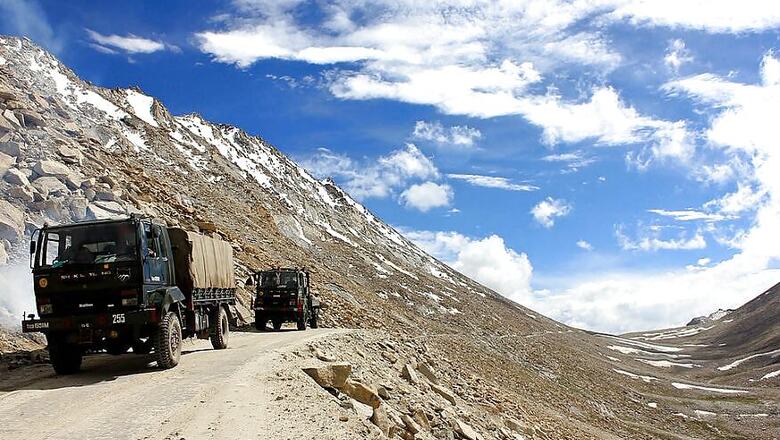
views
As we stepped down ‘Kushak Bakula Rinpoche’ Airport in Leh, the air was fresh and crisp, the temperature zero and fresh snow on the ground. The warm smile of our taxi driver, Dorji, lifted our spirits. In the market, there was usual hustle bustle. At our homestay, one of us asked how business was. “It’s good madam ji,” came the reply.
As we started to have Kahwa, Kunjas, the lady caretaker got us talking.
“Now that you have got a Union Territory (UT) status, how do you think it will impact you?”
“This is good for us. Humein Kashmir se aazadi mil gayi,” she said. We were amazed at the political awareness of the lady who epitomised understanding and wisdom that comes with a life honed by experience of living in a tough area.
“You talk good Hindi,” I remarked. To this came the proud reply: “We are Indian, madam.” Hindi seems to be popular and spoken widely in Ladakh.
The next day, we made a visit to ‘Phyang’ village. Here, we met a 20-year-old self-help group of 10 women. They take the monastery land on rent and grow crops. Selling those crops was their main source of income. “For a woman, life is tougher, especially in the mountains where you have to do most work manually,” one of them said.
There are 2-3 kids in each family and very often the main source of income is selling milk. They don’t earn much profit selling vegetables due to high logistical costs. We interacted with the group over hot salted tea. Though the terrain and the working conditions are difficult, that clearly does not diminish their indomitable spirits.
Asked about removal of article 370, they all were very happy. They seemed to be aware of political concepts such as single citizenship, fundamental rights and ‘hamari apni sarkar’. When asked what difference it will make to their lives, one of them remarked, “Our vegetables can now be sold to distant places at a better price.”
This was very insightful as the local produce is grown in organic, eco- friendly manner and can have significant commercial value.
“Our children will not have to go far away as there will be good institutions here,” said Rhen Chen whose two children were studying in Dehradun as there are no good educational institutes in Ladakh. I could see the pain in her eyes. She further said there is no one to make any noise and the house is forever quite.
Our next stop was the SEWA training centre set up in 2018. We met girls who were learning weaving of pashmina among other activities. Ladakh produces the finest pashmina wool in the world, which has a high demand globally. However, due to biased policy of erstwhile Jammu and Kashmir government, Ladakh got incentives only till the shearing stage after which the wool was taken to Kashmir where it was woven and made into shawls etc. Thus, the maximum value addition took place in Kashmir and Ladakh was reduced to supplier of raw material.
Amina Khatoon, in charge of administration and accounts at SEWA, has been with the organisation for the past 16 years. She has two children and symbolises modern empowered women. She was happy with the grant of UT status to Ladakh. “We have 1,200 SEWA members in Ladakh and make products, but there is no market here. With the status of UT, we hope there will be increased demand for our products.”
Shekhunissa, a shy intern at the centre, said, “I am hopeful that with the UT status, there will be more jobs and I will be able to stand on my own feet.”
The next day, we went to EGM College, Leh.
The impact of UT status on the students was articulated by Yang Chen Lamo, who was extremely happy that the examinations would now be held on time and students would be awarded their degrees timely.
Rinchen Angmo (Asst. Prof, English) in EJM College was very hopeful for incoming of higher education institutes and avenues of employment for youth.
We wanted to know how article 370 impacted women specifically. So we posed a straight question to girl students of the college and the response was overwhelming.
“I had to get my migration certificate from Kashmir University without which I could not apply for higher education. Seeing the political disturbance in Kashmir my mother did not send me. As a result, I couldn’t apply for my higher studies. I completed my degree in four-and-a-half years and now I have exceeded the age for exams,” said Chamba Angmo.
“I had applied for an internship in Singapore. I applied for passport in Kashmir. After 15 days, the administration shifted to Jammu and my file couldn’t be traced. I spent two months tracing my file but they are always biased towards Ladakhi people and I could finally get my passport only after greasing palms,” said Diskit Chondol.
Women-Centric Schemes
Zenabin, nominated councillor of Kargil, says baring a few disturbances, the entire district of Kargil has been peaceful post abrogation of Article 370. She was hopeful that now they will get better jobs and funds from the Centre will directly reach them.
Rukiya Banu is also from Kargil and mother of three children, one of whom is studying engineering in Rajasthan. She was happy that now education centers will come to their district and was looking forward to better roads.
“All the money goes to Kashmir and they are always biased towards us. We do not get benefit of women-specific schemes of the central government,” said Stanzin Chusil
These marginalized voices are a reflection of a distant government and administrative set up pointing starkly to a perceived bias in the hitherto administrative arrangement that was primarily Kashmir valley centric, leaving Ladakh isolated, marginalised and disadvantaged.
It is perhaps a time to see the change. The hope shines through.
(The writer works at the GGS Indraprastha University. She has been a recipient of the prestigious Easmus Mundus Scholarship for European Research Masters at University of London. Views are personal)



















Comments
0 comment